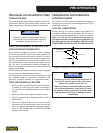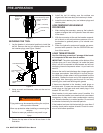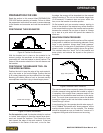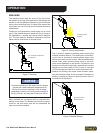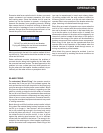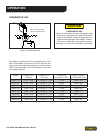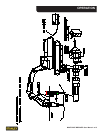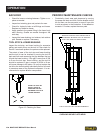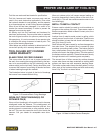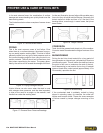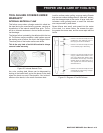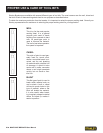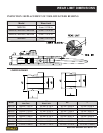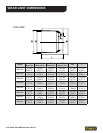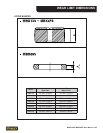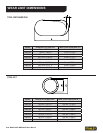
MAXFORCE BREAKER User Manual ◄ 17
PROPER USE & CARE OF TOOL BITS
Worn-outretainerpin(s)will causeunevenloadingon
thepin(s)themselves,causingfailureofthetoolorre-
tainerpin(s).Thiswillalsocauseexcessiveweartothe
frontbushing(s).
METAL-TO-METAL CONTACT
Extremecautionshouldbeusedtoavoidscratchesor
gougesonthesurfaceofthetool.Theseareascreatea
stressconcentrationMetal-to-MetalContactpoint,thus
weakeningthetool.
Anotherformofmetal-to-metalcontactisgalling,which
usuallyoccursfromthelackoflubrication.Specialcare
shouldbetakentokeepthetoolshanklubricatedevery
two(2)tothree(3)hours.
Steelfailuresthatwerecausedbysurfacedamagetake
twomainforms.Thesimplestformiscausedbydeep
scratchesonworkingsteelsurface.Thebrokensurface
hasashellpatternaroundthestartingpointoffailure,
similartotheoneinthefatiguefailure.Theotherpartsof
thebrokensurfacearebrittle.Thesefailuresworkslowly
throughthesteeluntilitsuddenlypartscompletely.
Thesecondformoffailurecausedbysurfacedamage
occurswhentherearedeepscratchesonworkingsteel
surfaceandtherewasalsoexcessivebendingstress.
Thebrokensurfacealsoshowstheshellpattern,butthe
otherpartsofthebrokensurfacearebrittleandusually
havea“lip”likethatinastressfailure.
Figure14.Metal-to-MetalContactExamples
Toolbitsaremadeandheattreatedtospecication.
Toolbits,howeverwellmade,arewearparts,andare
used inthemost destructiveapplications. Evenwhen
thehydraulicbreakerisusedproperly,andtheoperator
isanexperiencedone,atoolbitmaybecomedamaged.
Whenatoolbithasbeendamaged,itisusefultode-
terminethecauseimmediatelyinordertopreventthe
damagefromoccurringagain.
All Stanley tool bits are machined and hardened for
maximumperformance.Caremustbetakentomaintain
thetoolsoriginalconditionforoptimumproductivityand
lifeexpectancy.Itisnotuncommonforanoperatorwho
isunfamiliarwithusingahammertobreakapoint.This
ispartofthelearningexperience.
Listedbelowareseveralmethodstodeterminetoolfail-
ureandwillquicklyaidinwarrantydetermination.
TOOL FAILURE NOT COVERED
UNDER WARRANTY
BLANK FIRING OR FREE RUNNING
Thisoccurswhenthetoolisnotinpropercontactwith
thework,thuscausingtheenergyproducedbytheham-
mertobeconcentratedonthetoolretainer(s)andthe
retainerslot(s)onthetoolitself.Cautionshouldbeused
topreventthehammerfromslidingoffslantedsurfaces
orwhenbreakingthroughthinmaterial.
Theillustrationbelowistypicalofthekindofbreakage
thatoccursfromexcessiveblankring.
Figure13.ExcessiveBlankFiringBreakage
WORN-OUT FRONT BUSHING(S) OR
RETAINER PIN(S)
Worn-outfrontbushing(s)willcausethetooltobecome
misaligned inside the hammer. This misalignment will
causeunevencontactbetweenthepistonandtool,thus
causingstresstoconcentrateononeparticularareaof
thetool.Thiscanalsocausethetooltobindinsidethe
hammer. Call your dealer for acceptable wear allow-
ances.



